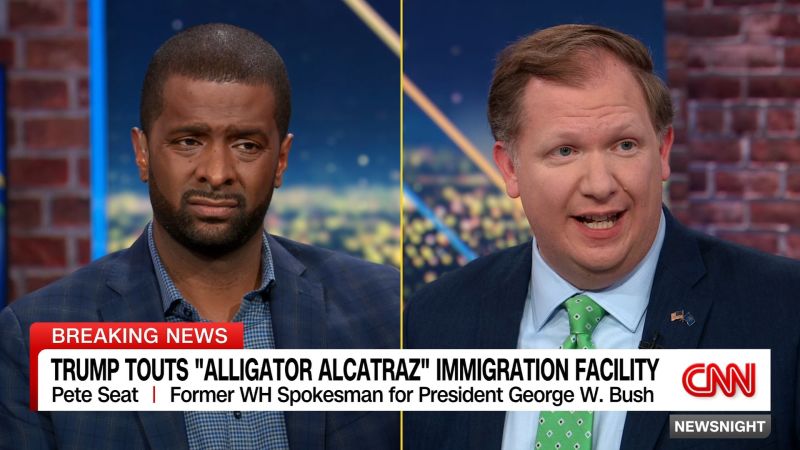During a recent visit to a Florida ICE detention facility, often referred to as “Alligator Alcatraz,” President Donald Trump reignited controversy by suggesting the deportation of violent American citizens. This proposal has drawn sharp criticism from various quarters, including CNN commentator Bakari Sellers, who has labeled the idea as one of the most un-American actions he has witnessed.
The facility in question, located in a remote part of Florida, has become a focal point in the ongoing debate over immigration policies and the treatment of detainees. President Trump’s comments during the tour have sparked a fresh wave of debate about the boundaries of citizenship and the rights of individuals within the United States.
Controversial Proposal and Its Implications
President Trump’s suggestion to deport violent American citizens has raised significant legal and ethical questions. The concept challenges the traditional understanding of citizenship, which is typically seen as an irrevocable status. Legal experts have pointed out that such a move could set a dangerous precedent, potentially undermining the constitutional rights of citizens.
Bakari Sellers, a prominent political commentator and former South Carolina state representative, voiced his concerns on CNN, stating that the proposal is not only impractical but deeply un-American. Sellers emphasized the importance of adhering to the principles that define American democracy, including due process and the protection of civil liberties.
Historical Context and Expert Opinions
The idea of deporting citizens is not entirely new but remains highly controversial. Historically, the United States has grappled with issues of citizenship and deportation, particularly during periods of heightened national security concerns. For instance, the internment of Japanese Americans during World War II is often cited as a cautionary tale of how fear can lead to the erosion of civil rights.
Legal scholars have been quick to point out that the U.S. Constitution provides robust protections for citizens, making the deportation of American citizens a legally dubious proposition. According to immigration law expert Professor Jane Doe, “The Constitution is clear that citizenship cannot be revoked arbitrarily. Any attempt to do so would face significant legal challenges.”
Reactions and Political Ramifications
The proposal has sparked a wide range of reactions from political leaders and advocacy groups. Civil rights organizations have condemned the idea, arguing that it could lead to abuses of power and the targeting of minority communities. Meanwhile, some conservative commentators have defended the President’s remarks, framing them as a necessary step in addressing crime and ensuring national security.
The political ramifications of this proposal are significant, as it touches on the broader debate over immigration policy and national identity. With the 2024 presidential election on the horizon, the issue is likely to become a focal point in the political discourse, influencing both policy decisions and voter sentiment.
Looking Ahead: The Future of Immigration Policy
As the debate over “Alligator Alcatraz” and the deportation of citizens continues, it remains to be seen how these discussions will shape future immigration policies. The controversy underscores the ongoing tensions between national security concerns and the protection of individual rights.
Experts suggest that a balanced approach is necessary, one that addresses security concerns while upholding the fundamental principles of justice and equality. As Professor Doe notes, “The challenge for policymakers is to find solutions that respect the rule of law and the rights of all individuals, regardless of their citizenship status.”
In conclusion, the debate over President Trump’s comments and the concept of “Alligator Alcatraz” highlights the complexities of immigration policy in the United States. As the nation grapples with these issues, the importance of adhering to constitutional principles and protecting civil liberties remains paramount.
